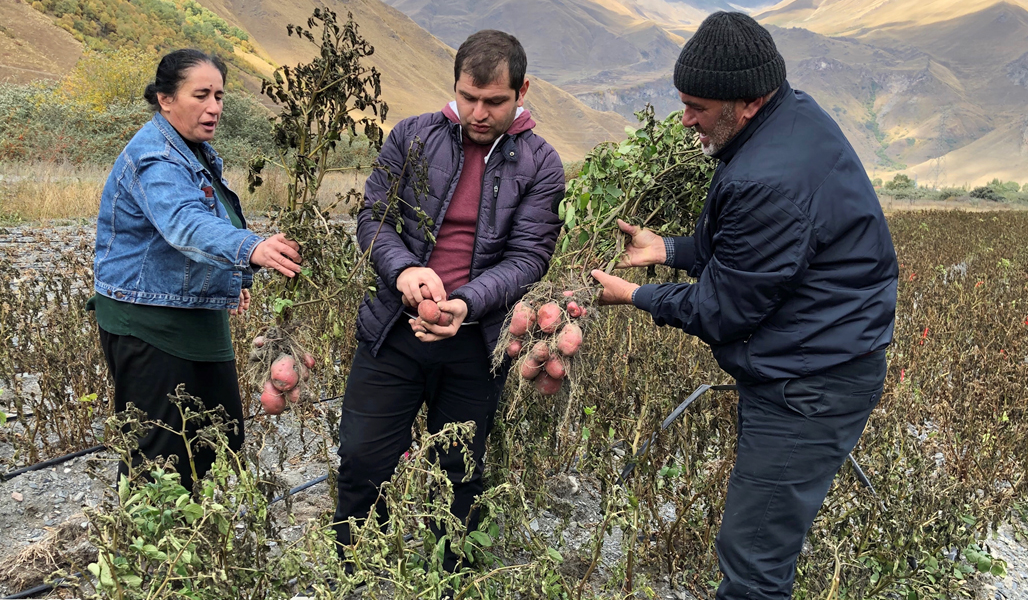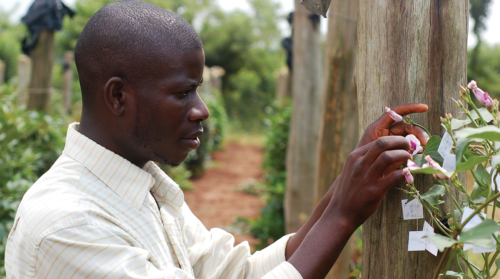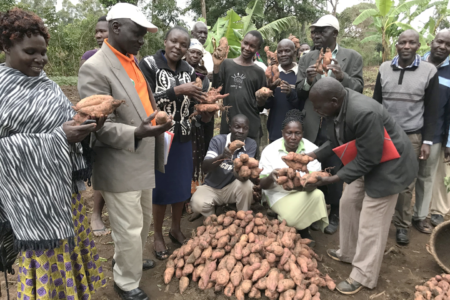
This project aims to boost productivity and incomes among Georgian smallscale potato producers by providing new knowledge and locally produced, quality seed potatoes of high-yielding genotypes.

Background
Georgians love their potatoes, referring to them as a ‘second bread’. The average consumption of potato in Georgia is around 55 kg per person per year, eaten mostly as fresh produce. This is well above the world average of around 33 kg. However, many potato farmers are smallscale producers and their levels of productivity remain low. The poor yields are due mainly to the accumulation of pests and diseases in seed potatoes and the consequent shortage of healthy planting materials. This lack of locally grown, quality seed potatoes of improved, high-yielding and disease-resistant varieties is currently the major constraint to improving potato productivity across the country
Objectives
Funded by the United States Agency for International Development (USAID), the project seeks to sustainably to increase the productivity and value of potato sales among smallholder farmers in Georgia. It will do this by increasing the scale and quality of local seed potato production by addressing the root causes of low productivity and facilitating the commercial and institutional platforms that underpin a sustainable potato marketing system. The specific objectives are:
- to build leadership within the Georgia Farmers Association (GFA) and establish a potato producers’ network;
- to establish a model farm to produce and demonstrate quality seed potatoes;
- to introduce new potato genotypes, establish proper seed potato standards, and improve the existing seed certification system; and
- to provide training to advisers, extension professionals, and men and women farmers in integrated potato production and seed health (ISH) management strategies.
Approach
In this project, the International Potato Center (CIP) works closely with local private sector stakeholders—a large seed potato producer, the national rural advisory service and the country’s largest agricultural enterprise—to facilitate the adoption of innovative productivity-enhancing technologies to grow the value of potato sales among small-scale farmers.
The project is comprised of two main components with activities focused on key target areas. The first component will establish a model seed farm using 3G technology and develop a potato producer network. A supporting potato council within the Georgia Farmers’ Association (GFA) will support the model farm operations. The producer network will represent the interests of farmers and act as a hub providing technical and marketing services in the target regions. Eventually, it will perform the role of supply chain manager, connecting farmers and their associations directly with buyers. This link is currently missing from local potato value chains. The network will develop its own business plan, laying the foundations for commercial sustainability and identifying key potential buyers, such as the Carrefour supermarket chain.
Establishing the model farm will involve constructing the physical infrastructure needed for large-scale seed potato production. Cutting edge science will be employed to achieve disease-free, high-yielding seed potato based on a rapid multiplication system developed by CIP.
The second component will introduce new potato genotypes and improved farming practices. It will ensure that farmers, extension agents and technical trainers have the knowledge they need to improve potato production practices and adopt integrated seed health management strategies. The project team will also ensure an effective seed potato certification system by adapting existing ‘best practices’ to the Georgian context and developing the protocols and field inspection guides needed to achieve certification. Training and other activities at the Scientific Research Center of Agriculture will build the capacity needed for it to become the key entity responsible for certification.
Expected outcomes
Seed potato producers engaging in this project are expected to increase their annual sales per hectare by 233% (from an average of USD 4,500 to nearly USD 15,000). This will happen in response to increased productivity of seed potatoes, from almost non-existent production to around 20 tons per hectare. In addition, around 1,500 farmers will receive training designed to help them improve their productivity levels. Due to enhanced access to seed potato of improved genotypes, farmers will increase their yields from an average of 12 to 25 tons per hectare.
Another key outcome is to obtain approval from the Ministry of Environmental Protection and Agriculture on the seed potato certification process and standards. This will lead to around 50% of potato farms in the project areas gaining certification as quality seed producers. These farms will provide improved seed potatoes to approximately 15,000 smallholders. In total, the average annual sales of all seed potato farms involved in the project should reach USD 8.7 million.
Key outcomes
| Targets | |
| Increased sales of seed potatoes per ha by potato farmers | 233% |
| Average yields of seed potatoes per ha | 20 tons |
| Proportion of seed potato farmers receiving certification | 50% |
| Smallholders with access to locally produced improved seed potatoes | 15,000 |
| Total average annual sales of seed potato for all participating farms | USD 8.7 million |
Contact
Vakhtang Mshvidobadze
Vakhtang.Mshvidobadze@cgiar.org
Thanks to our donors

Implementing partners




